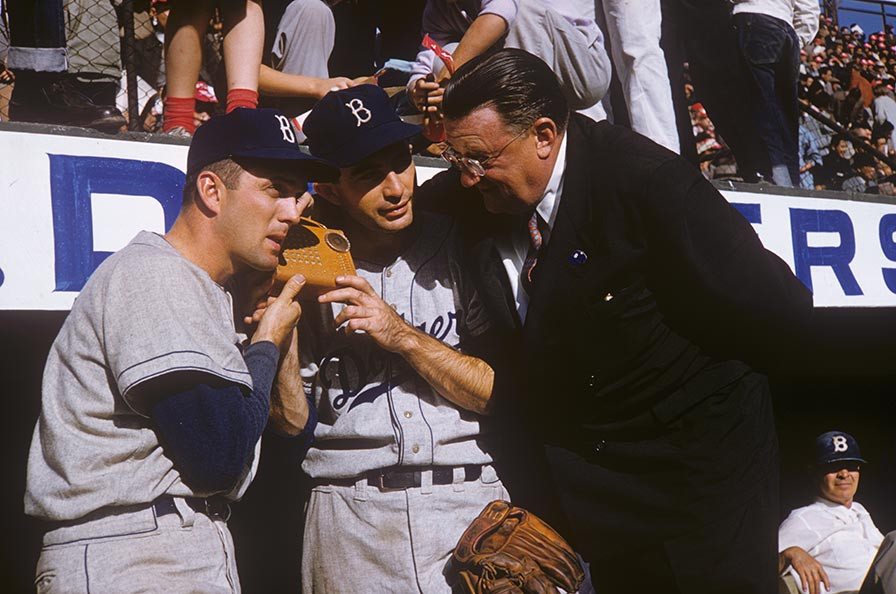This Day in Walter O’Malley History:
-
Dodger Vice President and Secretary Walter O’Malley sends this letter to Dodger President Branch Rickey, John L. Smith and Andrew J. Schmitz regarding shares of Dodger stock that were purchased on November 1. O’Malley, Rickey and Schmitz purchase 25% of the shares of Dodger stock in the transaction from the estate of former owner Ed McKeever. “Gentlemen: Please be advised that on your behalf I formally closed the baseball contract of October 27th, 1944. The closing took place yesterday, November 28th, 1944. I now hold in trust, subject to your further instructions, 2,750 shares of capital stock of Brooklyn National League Baseball Club Incorporated, and 1,750 shares of Ebbetts (sp.)-McKeever Exhibition Company Incorporated. A formal written statement of the closing will be prepared in the near future and sent to you for your files. I suggest that we have a meeting at the earliest possible time.”
-
Former Dodger star pitcher Carl Erskine writes a letter to Walter O’Malley regarding the recent Dodger Goodwill Tour to Japan. “I read with interest an article by Bob Considine containing some of your comments on the Japanese trip. Our trip ten years ago was a highlight for Betty (Erskine’s wife) and me. I was especially interested in your observation about the way the Japanese picked up the change of pace (pitch). I remember how amazed they were by it when I used it in 1956...Our very best to Mrs. O’Malley, Terry and Peter. Sincerely, Carl.”
-
Columnist Melvin Durslag writes in the Los Angeles Herald-Examiner about Dodger shortstop Maury Wills abruptly leaving the team’s 1966 Goodwill Tour to Japan without permission, embarrassing Walter O’Malley and other baseball officials on the trip. Wills, who was banged up after a long 1966 season, left the Dodgers after four days for home, but stopped in Honolulu, where he was spotted playing his banjo at a nightclub. This question and answer exchange from Durslag to Dodger President Walter O’Malley: “‘Your general manager has stated that the trading of Wills is up to you. Is this true?’ ‘If it’s up to me,’ he answered, ‘then I should be general manager.’ ‘What were your sentiments on Maury’s escape?’ ‘I was damned annoyed. He is, after all, the captain of our team.’ ‘Will you get rid of him?’ ‘I have no idea what we will do. I do understand he wants to see me. If he comes in, I’ll find out what he has on his mind.’ ‘Have you ever before entered into such a rhubarb at the player level?’ ‘Never,’ he responded. ‘I pay a general manager and three or four vice presidents so that I won’t have to enter into these situations. We were treated like royalty (in Japan). The players were given radios, TV sets, binoculars, cameras, tape recorders, pearls and other gifts. In fact, we got so much that we all got stuck for duty. The hospitality on the trip was unexcelled.’ ‘Some have contended that the prospect of a post-season tour so depressed your players that they performed poorly in the World Series (losing four straight to Baltimore).’ O’Malley replied, ‘Anytime a baseball player gets aggravated over the opportunity to make money, it will be a new day. The Yankees lost four straight to us in the World Series of 1963. They weren’t going to Japan. In this business you win four straight and you lose four straight.’” Durslag concludes his column by pointing out that not many clubs would be interested in Wills at 34 years old and making $75,000 a year. “At that figure, most shortstops would have endured the rigors of Japan.” Melvin Durslag, Los Angeles Herald-Examiner, November 29, 1966
-
Walter O’Malley writes a tongue-in-cheek letter to William E. Linthicum, Executive Vice President of Silverado Country Club in Napa, California, who had sent a photograph of O’Malley’s foursome at the recent Kaiser Pro Am Golf Tournament. “It was pleasant receiving the picture and to know that my watermelon was not prominent from the angle used. I must take issue, however, with your statement that I was not the ‘best golfer’. Ray Floyd, the Pro also in the picture, was low gross in the Pro Am due to my inspiration — 65. The next day, without me, he had a 79 and struck out. What more could I do for the cause?”


